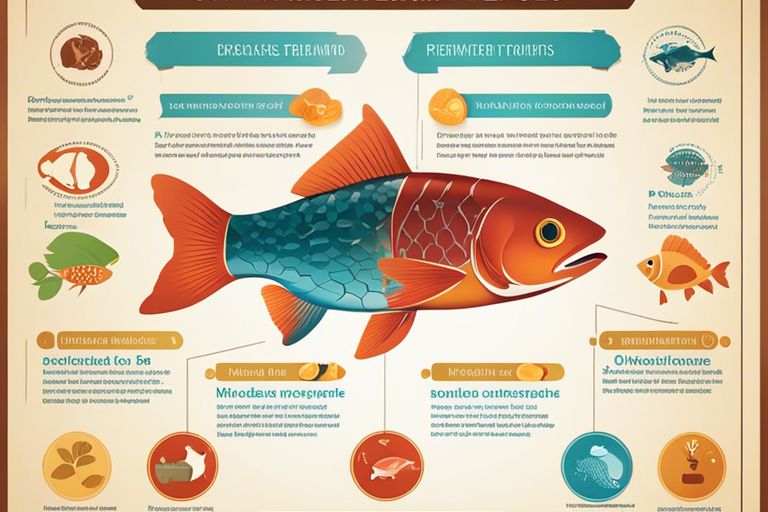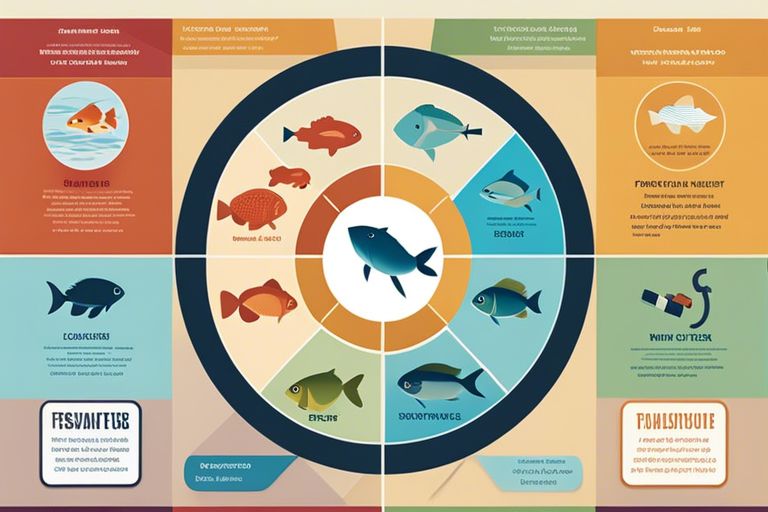Most hobbyists encounter common diseases in their freshwater fish at some point, and being able to recognize the symptoms and treat them promptly is crucial for the well-being of your aquatic pets. In this comprehensive guide, we will discuss some of the most prevalent diseases that affect freshwater fish and provide effective treatment methods to help you keep your fish healthy and thriving. By gaining knowledge about these common illnesses and their treatments, you can ensure a vibrant and disease-free environment in your aquarium.

How to Diagnose Illnesses in Freshwater Fish
Identifying Symptoms and Behavioral Changes
While diagnosing illnesses in freshwater fish, the first step is to observe any symptoms or changes in behavior. Look out for signs such as abnormal swimming patterns, loss of appetite, lethargy, color changes, fin deterioration, or spots on the body.
Tips for Observing Your Fish and Water Quality Factors
Assuming you suspect your fish may be unwell, closely monitor their behavior and the water quality of the aquarium. Pay attention to factors such as temperature fluctuations, pH levels, ammonia, nitrites, and nitrates in the water. The health of your fish is closely tied to the conditions of their environment.
- Regularly test the water parameters using reliable test kits.
- Monitor the oxygen levels and ensure proper filtration.
Identifying changes in your fish’s behavior and appearance is crucial in determining if they are suffering from an illness. Monitoring the water quality factors is equally important, as poor conditions can weaken the immune system of your fish and make them more susceptible to diseases.

Treatment Strategies for Freshwater Fish Diseases
Quarantine Procedures: The First Line of Defense
On introducing new fish to your aquarium, it is crucial to quarantine them first. This practice helps in preventing the spread of any potential diseases to your existing fish population. When quarantining, closely monitor the new fish for signs of illness, and treat them accordingly before introducing them to the main tank.
Medication and Dosing Tips for Effective Treatment
Assuming you’ve identified a disease in your freshwater fish, choosing the right medication and administering it properly is vital for successful treatment. Before medicating your fish, ensure the medication is suitable for the specific illness as using the wrong medication can be harmful. Follow dosing instructions carefully and complete the full course of treatment even if the fish show signs of improvement.
- Always follow the manufacturer’s instructions for dosing to avoid underdosing or overdosing.
- Monitor your fish closely during treatment for any adverse reactions to the medication.
- Perceiving improvements in your fish’s condition can take time, so be patient and consistent with the treatment regimen.
Defense
Assuming you are proactive in implementing quarantine procedures and following medication and dosing tips, you are better equipped to combat common diseases in freshwater fish effectively. By establishing a healthy environment and prompt treatment protocols, you can safeguard the well-being of your fish and maintain a thriving aquarium ecosystem. Bear in mind, prevention and early intervention are key in managing and treating freshwater fish diseases.

Preventative Measures and Best Practices
Factors Impacting Fish Health: Diet, Stress, and Environment
On average, freshwater fish diseases are often linked to specific factors that impact their health, including diet quality, stress levels, and environmental conditions. A balanced and nutritious diet is crucial for fish wellbeing, as it boosts their immune system and overall health. Stress factors such as overcrowding, aggressive tankmates, or sudden changes in water parameters can weaken their immune system, making them more susceptible to diseases. Lastly, maintaining a stable and clean environment with proper filtration and water quality is necessary for preventing common fish illnesses.
- Ensure a balanced and nutritious diet for optimal fish health.
- Reduce stress factors by providing adequate space and a harmonious tank environment.
- Maintain a stable and clean habitat with proper water quality and filtration systems.
Assume that by addressing these factors proactively, you can significantly reduce the risk of diseases among your freshwater fish population.
Regular Maintenance Tips to Prevent Outbreaks
Maintenance of your freshwater aquarium is crucial in preventing disease outbreaks and ensuring the health of your fish. Regular water changes, tank cleaning, and equipment maintenance are key components of a successful maintenance routine. Testing water parameters regularly and monitoring fish behavior can help detect any issues early on, preventing potential outbreaks.
- Perform regular water changes and tank cleanings to eliminate harmful substances and bacteria.
- Check and maintain your filtration system and other equipment to ensure optimal functioning.
- Monitor water parameters and fish behavior closely to detect any signs of stress or illness.
After following these maintenance tips diligently, you can enjoy a thriving and disease-free freshwater aquarium environment for your fish.
Advanced Care for Freshwater Fish
- Understanding the Role of Immune Support
- How-To Guide for Creating a Healthy Aquarium Ecosystem
Understanding the Role of Immune Support
Even the healthiest freshwater fish can be susceptible to diseases if their immune system is not functioning optimally. Immune support plays a crucial role in keeping fish healthy and resilient against common pathogens. By understanding how to boost their immune system, you can help your fish fight off potential illnesses more effectively.
How-To Guide for Creating a Healthy Aquarium Ecosystem
With the right knowledge and tools, you can create a healthy and balanced ecosystem in your aquarium that promotes the well-being of your freshwater fish. Maintaining good water quality, providing a varied diet, and creating a stress-free environment are key components of a healthy aquarium ecosystem. By following a few simple steps, you can ensure that your fish thrive and remain disease-free.
Guide: When setting up your aquarium, make sure to cycle the tank properly to establish beneficial bacteria that will help maintain water quality. Regular water testing and maintenance, along with proper filtration and aeration, are vital for creating a stable aquatic environment. Additionally, consider the specific needs of the fish species you are keeping and adjust the tank conditions accordingly to mimic their natural habitat as closely as possible.
Summing up
The health of freshwater fish can be affected by a variety of common diseases, such as ich, fungal infections, and parasitic infestations. By maintaining proper water quality, diet, and tank cleanliness, fish owners can help prevent these diseases from occurring. If a disease does arise, it is important to identify it promptly and seek appropriate treatment, such as using medications, adjusting water parameters, or isolating the affected fish. Being proactive and well-informed about common fish diseases and their treatments is crucial for ensuring the well-being of freshwater fish in aquariums.
FAQ
Q: What are common diseases in freshwater fish?
A: Common diseases in freshwater fish include ich, fin rot, dropsy, and velvet disease.
Q: How can I prevent diseases in my freshwater fish?
A: To prevent diseases in freshwater fish, maintain good water quality, avoid overcrowding, quarantine new fish before adding them to your tank, and feed a nutritious diet.
Q: What is ich and how can it be treated?
A: Ich, or ichthyophthiriasis, is a common parasite that causes white spots on fish. It can be treated with aquarium salt, raised temperatures, and medications like copper-based treatments.
Q: What is fin rot and how can it be treated?
A: Fin rot is a bacterial infection that causes the fins of fish to deteriorate. It can be treated by improving water quality, using antibiotics, and adding salt to the tank.
Q: What is dropsy and how can it be treated?
A: Dropsy is a condition characterized by swelling and fluid retention in fish. It can be caused by bacterial infections or organ failure. Treatment involves antibiotics, improving water quality, and isolating the infected fish.
Q: What is velvet disease and how can it be treated?
A: Velvet disease is a parasitic infection that appears as a gold or rust-colored dust on fish. It can be treated with medications like copper sulfate, formalin, or malachite green.
Q: How can I tell if my freshwater fish is sick?
A: Signs that your freshwater fish may be sick include changes in behavior, loss of appetite, visible parasites or abnormalities on the fish’s body, lethargy, and difficulty swimming or breathing.











